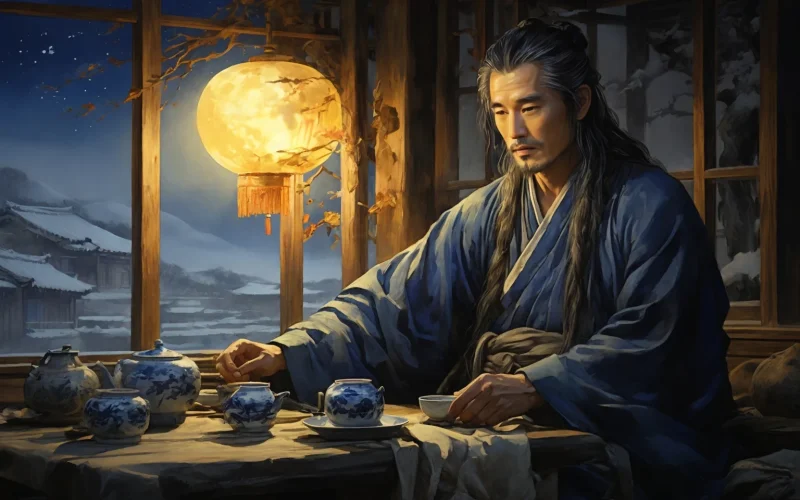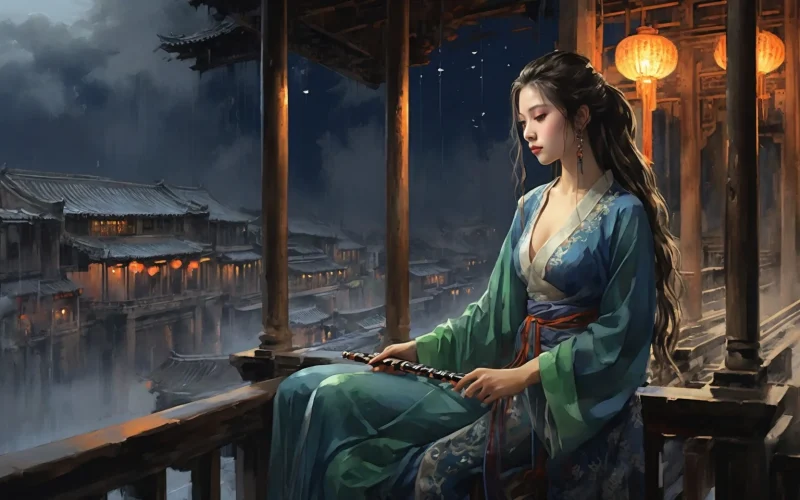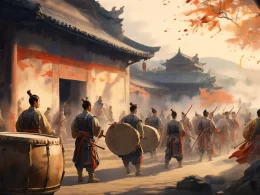Sleepless alone at an inn by cold lamplight,
Why should a roamer feel so sad and drear?
Thinking of my home far away tonight,
I'll have more frosty hair in the new year.
Original Poem
「除夜作」
高适
旅馆寒灯独不眠,客心何事转凄然。
故乡今夜思千里,霜鬓明朝又一年。
Interpretation
Gao Shi, a renowned poet of the Tang Dynasty, was famous for his bold and vigorous frontier poetry. However, "Composing on New Year's Eve" departs from his usual heroic style, adopting a plain and natural tone to depict the loneliness and melancholy of New Year's Eve. As the poet stayed in a foreign land, he spent the night alone by the lamp, missing his family and reflecting on the relentless passage of time. The poem authentically portrays the sorrow and homesickness that travelers often feel during festive occasions.
First Couplet:“旅馆寒灯独不眠,客心何事转凄然。”
"In a lonely inn, the cold lamp flickers as I lie awake; Why does a traveler’s heart turn so desolate?"
The poet describes himself staying in a cold, desolate inn, struggling to fall asleep amid the quiet night. The "cold lamp" symbolizes a chilly and solitary atmosphere, while "lying awake alone" emphasizes his unshakable feelings of loneliness. The rhetorical question vividly conveys his deep sorrow and grief as a wanderer far from home.
Second Couplet:“故乡今夜思千里,霜鬓明朝又一年。”
"Tonight, my family must think of me from a thousand miles away; Tomorrow, another year passes, and my hair turns grayer."
Here, the poet transitions to his longing for home and his lament over the passing of time. "Thinking of me from a thousand miles away" subtly expresses the deep connection between him and his loved ones, while "grayer hair" metaphorically signifies the toll of time and the hardships of a wandering life. These lines carry the weight of both temporal and emotional struggles, presenting a profound and poignant reflection.
Literary Features
- Plain yet profound language: The poem employs simple and accessible words, free from ornate diction, yet it profoundly expresses the poet’s complex emotions, exemplifying the artistry of “finding the extraordinary in simplicity.”
- Authentic and nuanced emotions: Through detailed depictions and contrasts, such as the imagery of festive reunion juxtaposed with solitary wakefulness, the poem conveys the traveler’s heightened sense of homesickness and solitude during the festive season.
- Subtlety and duality: The interplay between "home’s thousand-mile yearning" and "another gray-haired year" conveys familial longing and the poet’s own reflections with restrained yet powerful sentiment.
- Tightly structured composition: The four lines are tightly woven around the theme of "New Year's Eve," linking the setting, emotions, and reflections, leaving a resonant impression on readers.
Overall Appreciation
"Written on New Year's Eve" uses the setting of New Year's Eve to delve into the poet’s complex emotions as a traveler in a foreign land. Starting with the solitary image of "a cold lamp and sleepless night," it captures the loneliness of a festive night spent far from loved ones. The poem seamlessly transitions to the poet's deep longing for home and his lamentation over aging, enriching its emotional depth. With its plain yet evocative language, the poem creates a profound and lasting impression, drawing readers into its vivid and relatable world of emotions.
Insights
This poem reminds us to cherish moments of family togetherness and to remain mindful of the unspoken bonds of love and care that connect us with our loved ones, even across great distances. It also prompts reflection on the inexorable passage of time, encouraging us to value each fleeting moment and nurture relationships while we can. Moreover, the poet’s artistic techniques—expressing deep emotions through subtle contrasts and simple language—offer inspiration for conveying complex sentiments in a nuanced and impactful way.
Poem translator
Xu Yuan-chong (许渊冲)
About the poet

Gao Shi (高适), 706 - 765 AD, was a native of Jing County, Hebei Province. In his early years, his family was poor, and he was disappointed in his career. He was famous for his border poems, which are not only numerous and wide in subject matter, but also present a unique style and perspective.












